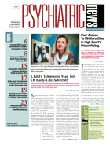Something is better than nothing, isn't it? Except perhaps when "nothing" is really something.
Placebo has traditionally been seen as the equivalent of an inactive treatment, and that has contributed to claims that therapies for depression "don't work" or are "the same as placebo," said Arif Khan, M.D. medical director and principal investigator at the NorthWest Clinical Research Center in Bellevue, Wash.
He spoke at APA's annual meeting in Honolulu in May.
However, after analyzing more than 100 clinical trials, Khan hypothesized that placebo treatment isn't "nothing," but rather is a form of psychotherapy that provides a measurable benefit to the patient.
Other panelists at the same session added their support to his views.
Walter Brown, M.D., a clinical professor of psychiatry at Brown University and Tufts University, noted that placebos do a lot more than pretend to be medications.
"Patients get all the elements common to any medical treatment," he said. "They have a healer and get an evaluation, a diagnosis, a prognosis, and healing ritual."
Patients value warmth, care, and interaction. He pointed to studies in illnesses as diverse as tonsillitis, irritable bowel syndrome, noncardiac chest pain, and the common cold that found that practitioner involvement lessened symptom severity and left patients feeling better.
Simply getting a diagnosis can help, he said. "All cultures have deeply felt belief systems about illness origins."
Why Healing Rituals Work
"Healing rituals work because they engender hope and reverse demoralization," said Brown, citing a study comparing oral counseling to get more exercise to the same suggestion accompanied by a written prescription on a prescription pad. About 86 percent of the patients given the written intervention boosted their exercise, compared with just 51 percent of those given the oral instructions.
What, then, are the implications for antidepressant trials?
"When treating mildly and moderately ill patients with placebo, you're treating with an intervention that is as effective as psychotherapy," he said. "If you have a trial in which a drug produces the same results as placebo, that is not a failure of the drug. It's like a trial showing that a drug and psychotherapy were equal."
Placebo control for depression trials must be reconceptualized as noninferiority trials, because investigators are comparing a new therapy with one already known to be effective for depression.
Just One Look Can Make a Difference
Patient expectations play an important role in the placebo effect, sometimes in ways that might mystify clinicians.
For instance, studies found that when people simply looked at medications, they thought capsules would be more effective than tablets and that colored medications were better than white ones, said Mark Sinyor, M.D., M.Sc., a resident in the Psychiatry Department at the University of Toronto and Sunnybrook Health Sciences Centre.
Another study in patients with migraine found that 26 percent responded to the placebo in pill form, while 32 percent responded to an injectable placebo, a significant difference, said Sinyor.
Other studies have concluded that higher expectations of treatment success contribute to greater reduction in depression symptoms and that the treatment alliance was more important than the study cohort, he said.
Those and other studies indicate, he noted, that "patients in the placebo group are better off thinking they are getting good treatment and feeling good about the treatment, than not feeling so good about it and being in the active-drug group."
Yet another form of expectation derives from a trial's structure.
Sinyor's recent analysis of clinical trials in depression concluded that response and remission rates to an active medication in drug-drug trials are higher than in drug-placebo studies, with drug-drug-placebo designs falling in the middle.
He also found that placebo response in drug-drug-placebo trials was higher than in drug-placebo trials.
"The mere presence of a placebo arm lowers expectations and lowers drug-response rates," he concluded.
Bias Introduced?
Patients aren't the only ones with expectations, said Sinyor. The same might be true of those who evaluate the patient's status after an intervention.
Their experience might give them an edge in discerning which patients are on the active drug and which are on placebo, introducing some bias into their reporting, he said. "Maybe we should randomize raters as well as patients."
Because patients' pretreatment expectations can be measured and controlled for, future clinical trials should be designed to account for that effect, he said.
New antidepressant trial designs are needed to overcome a variety of problems, including the effects of placebo, said David Mischoulon, M.D., Ph.D., an associate professor of psychiatry at Harvard Medical School and director of research in the Depression Clinical and Research Program at Massachusetts General Hospital.
A number of alternative designs have been proposed, and all have advantages and disadvantages, said Mischoulon. The ideal trial would require reasonable sample sizes, be cost-effective, be relatively easy to implement, and give a good chance of finding the truth—regardless of positive or negative findings, he said.

